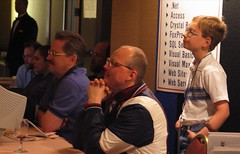In InfoWorld: Application development, Ephraim Schwartz editorializes The end of ‘one throat to choke’?. “OK, first let’s dispel two myths foisted on us by big-name software industry personalities.”
Instead of one throat to choke, one stack to manage, Benioff would have us believe that large companies want to go out and link dozens of smaller applications together, some of them untried and untested. That’s what componentization is all about, I suppose. But I tell you, this idea runs completely counter to the real world, where companies are trying mightily to reduce the number of applications they need to manage.
When I talked with Greenbaum about this, however, he called me naðve. The idea of one throat to choke is overhyped, he says. While he agrees that no major enterprise is going to put its apps on a “dinky little infrastructure” — AppExchange, that is — he says no one vendor meets all of the requirements. If Greenbaum is right, then we end up with a lot of battlegrounds. And that is exactly what Evan Quinn, vice president of applications research at IDC, believes will happen.
Success comes from managing change, not trying to stop it. Software is not a commodity item where the goal is to reduce the number in stock. Reducing the number of interchangeable items in your business streamlines the inventory management and control, but softwares are not interchangeable. New versions offer new features. New software platforms offer new ways to manage your business. Companies that really innovate beat the competition.
The “one throat to choke” idea has never worked. Companies that invested big in projects with IBM, Anderson, Oracle, SAP, Microsoft or any of the others never really had that much leverage against the big boys. You might be able to put up a fuss and kick them in the shins, and they might even settle out of court after costing you millions, but the companies went on, leaving a little trail of disasters behind them. Like all investments, diversification is the strategy to minimizing the “all eggs in one basket” risk factors.
Hmm. Diversification is good. Like interoperability. Competition breeds innovation. Monopolies breed stagnation. Working Well With Others is Good. Now, where have I read that before?
 Very sad news: Drew Speedie (third from left) and his son, Brent Speedie (right) passed away while on vacation in Yellowstone.
Very sad news: Drew Speedie (third from left) and his son, Brent Speedie (right) passed away while on vacation in Yellowstone.